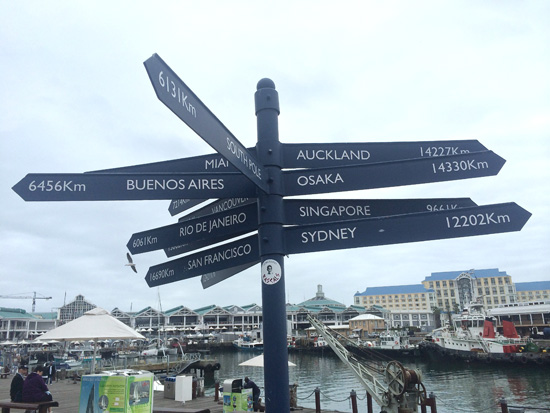
Photo taken at Waterfront Cape Town South Africa_ by People's Daily Online
UN Secretary-General Ban Ki-moon has invited world leaders, from government, finance, business, and civil society to Climate Summit 2014 held in New York this 23 September, to galvanize and catalyze climate action.
He has asked these leaders to bring bold announcements and actions to the Summit that will reduce emissions, strengthen climate resilience, and mobilize political will for a meaningful legal agreement in 2015.
Climate Summit 2014 provides a unique opportunity for leaders to champion an ambitious vision, anchored in action that will enable a meaningful global agreement in 2015.
People’s Daily Online, SA recently gets a chance to make an exclusive interview with the Department of Environmental Affairs of South Africa directly, on the attitude they hold towards global climate change.
P for People’s Daily Online
DEA for Department of Environmental Affairs of South Africa
P: Would you please give a brief introduction on the current strategies South Africa implement to resist global climate change?
DEA: South Africa’s vision for a just transition to a climate-resilient and lower-carbon economy and society is presented in the National Climate Change Response Policy with the objectives of (i) managing the inevitable climate change impacts through interventions that build and sustain South Africa’s social, economic and environmental resilience and emergency response capacity; and (ii) making a fair contribution to the global effort to stabilise greenhouse gas (GHG) concentrations.
Key areas of implementation include (i) development of long term adaptation scenarios, to analyse the impacts of climate change in key sectors including water, agriculture, forestry, fisheries, biodiversity, health and human settlements, and possible adaptation responses; (ii) analysing the mitigation potential in key sectors of the economy, including energy, industry, transport, agriculture and waste; (iii) development of a system for tracking the transition to a lower carbon and climate resilient economy.
P: National Climate Change Response mentioned that SA was going to make a fair contribution to the global effort to reduce greenhouse gas emissions. What are the specific policies you are planning to impose accordingly?
DEA: South Africa has announced that it will be implementing mitigation actions that will collectively result in a 34% and a 42% deviation below its ‘Business As Usual’ emissions growth trajectory by 2020 and 2025 respectively. Work is underway towards this objective.
P: It also noted that the response to climate change must be appropriate to state of development, actual capacity and national circumstances. How do you take the balance among them?
DEA: In accordance with South Africa's National Development Plan, and National Climate Change Response Policy, the overall approach to implementation is developmental, in that climate change responses are prioritised where they have significant mitigation and adaptation benefits, and significant economic growth, job creation, public health, risk management and poverty alleviation benefits.
P: The development of many other countries exposes the fallacy of short-term industrial gain at long-term environmental expense. Meanwhile, environment protection is sometimes costing. What’s your budget on the response to the climate change or environment protection? Where does the fund come from?
DEA: Climate Change response is the responsibility of a number of different national departments, as well as provinces. This work is funded both from the national fiscus as well as donor funding in some instances.
P: Since developed countries suggest restricting carbon emissions globally, yet some developing countries argued that it’s unfair, when former have polluted the environment ahead and turn to blame it on the latter. What’s your opinion? Which side will South Africa take?
DEA: South Africa's position is that the new global legal agreement, to be concluded at COP 21 in Paris in 2015, must give effect to the objective of the UN Framework Convention on Climate Change, as set out in Article 2. The future agreement must elaborate a durable, legal, multilateral rules-based climate change system to be inclusive (applicable to all Parties); fair (give effect to the principles of equity and common but differentiated responsibilities and respective capabilities); effective (be based on sound science); and adequate to keep temperature increase below 2°C. It must give equal priority to mitigation and adaptation, and provide means of implementation to enable developing countries to transition to lower carbon and climate resilient economies.
